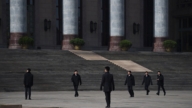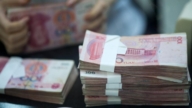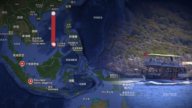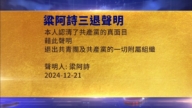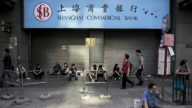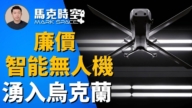【新唐人2014年08月13日讯】据中共官方媒体报导,目前有150多名中国经济犯罪嫌疑人正在美国逍遥法外,但由于中、美两国没有引渡条约,很难将这些人缉捕回国受审。分析指出,中国的人权记录极差,即便是罪犯,美国也不会贸然将他们押送回中国。
8月11号,中共官方英文报纸《中国日报》,援引中共公安部“国际合作局”局长廖进荣的话指称,美国已成为中国经济犯罪嫌疑人逃避法律制裁的首选目地地,目前在美国,约有150多名中国经济犯罪嫌疑人在逃,其中多数是贪官或贪污嫌疑人。
旅美中国社会问题研究人士张健指出,报导中的150多名中国经济犯罪嫌疑人,这个数字严重缩水。
旅美中国社会问题研究人士张健:“以150名来引述这个,也完全推翻了中共它自己统计的数据,它每年有几万名的贪官,有多少万名的贪官都在裸体做官。在中国,每年潜逃出罪犯,它是有据可查的,他潜逃的国家也是有据可查的,合作局用150名这个数字来形容,其实完全就是想把中国贪污腐败的问题,让它缩小,让它淡化在老百姓心目中的影响。”
据中国“人民银行”2011年一份报告披露,从20世纪90年代中期到2008年,中国外逃党政干部,公安、司法干部和国家事业单位、国有企业高层管理人员,以及驻外中资机构外逃、失踪人数达1万6千到1万8千人,携带款项达8000亿元人民币。
廖进荣表示,由于中、美两国没有引渡条约,加上各种程序复杂冗长,要把这些犯罪嫌疑人缉捕回中国受审,面临很多困难。
报导说,公安部的数据显示,过去10年,只有两名经济犯罪嫌疑人被缉捕回中国受审,其中包括前“中国银行广东开平支行”行长余振东。余振东被控涉嫌贪污、挪用公款4亿8千2百万美元,他在逃亡美国两年半后,于2004年4月被美方驱逐出境,并押送到中国。
公安部“国际合作局”“美洲大洋洲工作处”处长王钢表示,由于缺乏引渡条约,中、美两国只能通过每年一次的“中美执法合作联合联络小组”,讨论相关重大问题,这显然不够。
北京时政观察人士华颇:“说因为中、美之间没有引渡条约,所以将那些嫌疑人引渡回来很困难,我想这有几层意思,第一就是开脱责任,第二,暗指美国和西方是腐败份子的藏污纳垢之地,第三,引渡不利,是多年来中国那些执法机关名声不佳,一直有严重的侵犯人权的问题,所以西方那些民主国家出于人权考虑,对中国一些犯罪嫌疑人引渡回中国,实行了非常严格的限制。”
美国纽约律师叶宁对《自由亚洲电台》指出,中、美两国都是“国际反酷刑公约”缔约国,如果中共不取消酷刑,即使两国有引渡条约,按照“国际反酷刑公约”第三条,只要被告证明可能受到酷刑,就不能引渡回中国。
旅美中国社会问题研究人士张健认为,中共有意让中国百姓对美国产生误解。
张健:“中国现在跟美国的经贸合作、军事合作,都来往的非常密切,也有高层的热线电话,这些东西都已经具备的情况下,对于一个罪犯的引渡,把所有难处都归罪于美国,美国似乎在阻挠,让老百姓感觉,美方是因为贪图这些罪犯的钱,或者贪图这些罪犯给美国带来巨大的经济利益,我觉得它抱着很强烈的一个目地。”
据英国《路透社》报导,中共新领导人习近平执政以来,在全国掀起反腐风暴,严厉打击“裸官”。据估算,目前中国约有100万名裸官。
北京时政观察人士华颇指出,如果将出逃美国的经济犯罪嫌疑人缉捕回国受审,可能会引发政坛地震。
华颇:“因为拔出萝卜带出泥,会使这150人背后那些大老虎、相关涉案人员产生极大惊恐,可能会引起政坛一个大震动,产生的影响可能是一个超级核爆!”
据了解,刚被立案审查的中共前政法委书记周永康的儿子周斌持有美国护照,而中共前党魁江泽民的儿子江绵恒,以及前国家副主席曾庆红的儿子曾伟,分别持有美国和澳大利亚护照。
采访/朱智善 编辑/陈洁 后制/陈建铭
China Says Over 150 “Economic Fugitives” Hide in the US
According to China’s official media, over 150 Chinese
“economic fugitives” are hiding in the US.
Because the two countries lack an extradition treaty,
it is difficult to get fugitives home to stand trial.
Analysts say as China has a very bad human rights record,
the US won’t casually hand criminals over to China.
On Aug. 11, China Daily cited Liao Jinrong, director general
of the International Cooperation Bureau (ICB) under
the Ministry of Public Security that
“the US has become the top destination
for Chinese fugitives fleeing the law”.
Over 150 economic fugitives from China, most of whom
are corrupt officials or face allegations of corruption,
remain in the US.
Zhang Jian, US-based China social affairs researcher says that
the number of “150” was much less than the fact.
Zhang Jian: “The number of ‘150’ completely
overthrew its own statistics.
Tens of thousands of corrupt officials and
‘naked officials’ each year flee abroad.
The regime has records and evidence to check and
the countries they have fled to can be traced.
ICB uses the figure of “150” to describe the issue,
in order to minimize the problem of corruption in China,
and to reduce the bad influence on civilians’ minds.”
A report made in 2011 by People’s Bank of China revealed
that from mid-1990s to 2008, 16,000 to 18,000 party officials
fled abroad or disappeared from China.
It includes officials, company executives and overseas staff,
and, an estimated 800 billion yuan ($123 billion)
has been transferred overseas.
Liao Jinrong said that due to the lack of an extradition treaty
as well as the complex and lengthy legal procedures,
it is difficult to get fugitives who
fled to the US back home to face trial.
Public Security figures show that over the past decade,
only two fugitives have been brought home to stand trial.
One was Yu Zhendong, former head of the Bank of China
branch in Kaiping, Guangdong.
Yu was found guilty of corruption and embezzlement
of funds of up to $482 million.
He was deported home by the US in April 2004 after
hiding for two and half years in the US.
Wang Gang, a senior official from the America and Oceanic
affairs division of the ministry’s ICB said that
lacking an extradition treaty, there is only an annual meeting
to discuss major concerns between the two countries,
it is not enough.
Hua Po, Beijing current affairs observer: “Regarding
lack of an extradition treaty it’s difficult to get fugitives home,
I think there are several reasons behind this.
First the regime shirks the responsibility.
Second, the US and the West are havens for corrupt officials.
Third, the failure to get fugitives home is because of
the bad reputation of China over violation of human rights.
Thus the democratic countries consider this point
to limit the hand over of fugitives.
US-based lawyer, Ye Ning told Radio Free Asia, China and
the US are signatories of the UN Convention Against Torture.
If China doesn’t stop torture, even if there is an extradition treaty,
according to the Convention, as long as the defender
can prove he has faced torture, the extradition won’t be applied.
Zhang Jian says that the Chinese Communist Party (CCP)
deliberately misled civilians to misunderstand the US.
Zhang Jian: “China has close economic and
military cooperation with the US.
There are high-level hotlines.
Under these conditions, to extradite a criminal,
and blame the US for causing difficulty, and
let Chinese civilians believe that the US is after these
fugitives’ money and huge economic interests,
I think the CCP has strong purposes.”
UK Reuters reported that since Xi Jinping took office
he launched a national anti-corruption campaign
to strictly fight “naked officials”.
There are estimated to be over 1 million “naked officials”
in China now.
Hua Po says that if the fugitives were extradited home
from the US to face trial, it would cause a political earthquake.
Hua Po: “To pull the carrot bringing out the mud. ‘Big tigers’
behind the 150 fugitives would be very afraid.
It would cause a huge political earthquake.
The impact could be equivalent to a super nuclear bomb!”
Sources say that Zhou Yongkang’s son Zhou Bin
holds a US citizen’s passport.
Jiang Zemin’s son Jiang Mianheng and Zeng Qinghong’s son
Zeng Wei separately have US and Australian passports.
Interview/Zhu Zhishan Edit/ChenJie Post-Production/Chen Jianming


